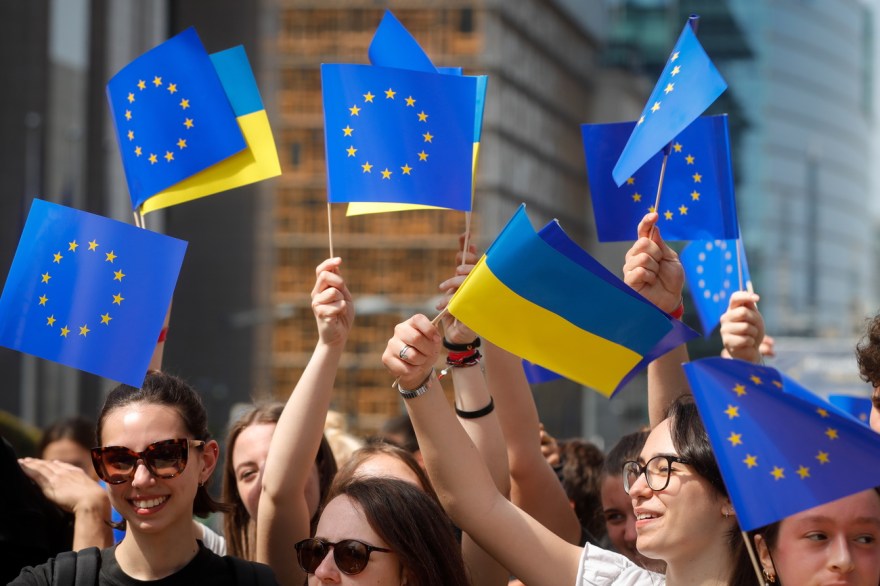Switzerland inspires Europe’s quiet democratic revolution
SWISSINFO.CH – Russia’s war in Ukraine has shifted power relations in Europe. In the European Union the demand is growing for participation from below. The recent Frontex referendum in Switzerland showed the way.
Russia’s war in Ukraine has shifted power relations in Europe. In the European Union the demand is growing for participation from below. The recent Frontex referendum in Switzerland showed the way.

With the war in Ukraine, the desire for more co-determination in the EU is growing.
Keystone / Stephanie Lecocq
For the first time ever, a week ago voters had the chance to give their views on the further development of an EU agency in a referendum. What was remarkable in this case was that the referendum did not take place in an EU member state, but in Switzerland. On Sunday 71.5% of voters favoured expansion of the European Border and Coast Guard Agency, known as Frontex. This agency is tasked with monitoring the outer borders of the European Union. As a Schengen-area member, Switzerland contributes to funding the agency.
The Frontex vote was the 63rd referendum in a European state on a European topic in the past 50 years. Thirteen of these took place in non-EU Switzerland, which in contrast to dozens of other states has never voted directly on joining the European Union.
In European public discussion, the democratic process here received little attention. At the moment all eyes are on Russia’s war in Ukraine and its consequences. Europe is mainly concerned with protecting itself from Moscow.
“The war in Ukraine is rapidly changing Europe’s self-perception,” says Alberto Alemanno, professor of law at New York University. A direct consequence is the new initiative in the previously neutral states Finland and Sweden to join the NATO military alliance.

In Denmark too, at the beginning of June, there will be a vote on aligning the country with the EU’s Common Security and Defence Policy.
“The fight in Ukraine is not just a matter of Ukraine, it is a challenge to everything we believe in, our values, democracy, human rights, peace and freedom,” said Danish Prime Minister Mette Frederiksen, announcing this new referendum on a European issue. So in June we will see another vote on Europe – the 64th.
For Danish-British political scientist Matt Qvortrup, who teaches at Coventry University in Britain, these popular votes are a counterweight to authoritarianism as it has expanded in the world in recent years. “History shows that those who rule are only prepared to share their power with citizens in times of crisis. That’s the kind of time we’re living in right now,” he says.
This is already having an effect on the European Union. The trend to democratisation was recently apparent from the results of what was called the Conference on the Future. “The war in Ukraine has made it clear that the EU needs to develop further,” said the co-chair of the conference, former Belgian premier Guy Verhofstadt, when the results became known.
The conference, announced a year ago, was attended by representatives of the EU institutions and the 27 member states but also 800 citizens from all over Europe chosen by lot. The group arrived at no fewer than 325 proposals for action – including basic democracy reforms such as the introduction of Europe-wide referendums, Europe-wide party lists for EU Parliament elections, and the abolition of the unanimity rule in many areas of politics.

“The momentum for a democratic quantum leap in Europe is there,” says Daniela Vancic, who followed the Conference on the Future of Europe for the Cologne thinktank Democracy International. “It will be crucial to convince a majority of governments in member states to agree to a treaty change process.”
In fact, in the central EU institutions, majorities support the most important findings of the Conference on the Future. The EU Parliament supports the appointment of a constitutional convention. A few days later, newly re-elected French president and current chair of the EU Council Emmanuel Macron declared: “We will have to reform our texts. One way to start this reform is to appoint a convention to review the treaties.”
Smaller EU member states are resisting this trend, because they fear that the EU-wide promotion of democracy tools might weaken the influence of individual states. But for their own citizens, the Conference on the Future was just stating the obvious. This is shown by a new study by the gfs.bern institute in Switzerland.
According to that study, fairly clear majorities of citizens in all EU member states favour the idea of being able to have their say on European issues both in national and in Europe-wide referendums.
Given the recent Frontex referendum in Switzerland, the European comparison study also examined how great the desire was for a national vote on the EU agency in the different countries: apart from the Nordic countries and the Netherlands, majorities favour the idea of a referendum.

Such citizen decision-making “shows that referendums are a very efficient way to get public discussions going,” says Daniel Graf of the Foundation for Direct Democracy, one of the sponsors of the study.
The other sponsor, economist Luzius Meisser, sums it up this way: “Europe is really ready for direct democracy. The study shows that voters can make up their own political minds and want more of a say.”
Translated from German by Terence MacNamee